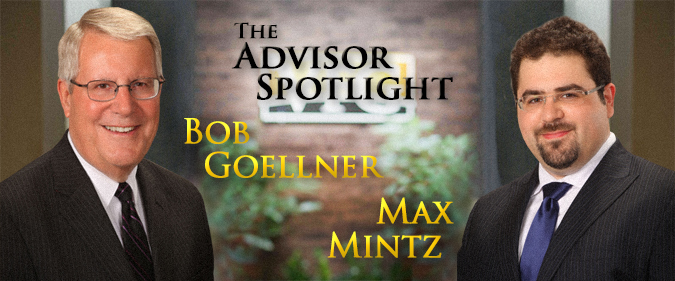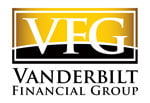
Editor’s Note: Each month Vanderbilt Financial Group features an advisor in the Vanderbilt family who exhibits the VFG values of Gratitude, Respect, Innovation, Teamwork and Trust on a consistent basis. These values impact their work with clients and VFG staff, and ultimately pushes for an excellence in their business practices that is unparalleled and incredibly unique. Beyond high-level producers, these advisors offer sage advice and best practices for boosting your business on your terms according to your values. This month’s Advisor Spotlight features Bob Goellner and Max Mintz of Common Interests Financial.
Give us a little information on your background and what drove you into the financial services industry.
Bob: I started a long time ago. I honestly didn’t want to start in the financial services industry, but a management opportunity that I was interested in landed me my start. Prior to that, I was actually a Methodist minister in the Seminary. When I got into the insurance business the joke was “I went from selling Fire Insurance to Life Insurance”. As a Financial Advisor, I sell “peace of mind”.
Max: I had no desire to be in financial services, ever. If you told me seven years ago that I would be a financial advisor today I would have laughed at you. Bob was my family’s financial advisor growing up. He has known me since I was a very large haired philosophy major in college. He introduced me to the idea of Sustainable, Responsible, and Impact investing, which to me as a philosophy major was amazing. I saw an opportunity to use the power of our investments and our money to do good in the world. He showed me an alternate path, and when he was looking for someone to come in and manage the office’s technology, I jumped at the opportunity.
What books, authors or thought-leaders have shaped the way you think? What about currently?
We have a very similar reading list, a few of the most notable would include:
- The 7 Habits of Highly Effective People by Stephen Covey
- The E-Myth by Michael Gerber
- How to Influence People by John Maxwell
- and of course, The Gospel.
A few others would include:
- What Got You There Won’t Get You There by Marshall Goldsmith
- Getting More by Stuart Diamond
- And lastly, a most recent read by Ben Gioia is Influence With A Heart
What do you enjoy most about working in a client-facing role?
Max: I was just at a client’s house last night and they asked me this same question, “why do you do what you do?” For me, the most rewarding thing about what we do and how our business is structured is the ability to create an impact in people’s lives on a very personal level. Sitting across a client’s dining room table and working with them on their cash flow, budget and saving for retirement, you realize how you are truly making a difference in their lives. I like being able to point to real people knowing that I have helped them and my work has impacted their lives. Hyperlocal one-on-one work is deeply fulfilling, and we also work on a global stage. We collaborate with some of the world’s largest asset managers and use the power of our investments and their investments to hold a stick to major corporations - like Amazon for example - and force them to make changes in their business practices. Being able to have an impact on a super-hyper-local-level, and also on the global stage simultaneously is what I value most.
Bob: One area that I truly enjoy is problem solving and relationship building. But I also thoroughly enjoy watching the change in the mindset of new clients as we start talking about, and heading towards, the subject of Sustainable and Responsible, Impact Investing. The level of enthusiasm starts to grow and grow as we proceed. It is fun to watch as they move in that direction!. You can actually see the lights go on. The most common reaction is often “I didn’t know you can do that, but I sure want to!”.
We often reference “the shoulder drop”, when we can see a client get comfortable. When they finally “get it” and let go of the stress of the meeting. It often first happens when they come to our office and the office dog greets them; it’s not what they expected.
What’s the most challenging aspect of working with clients? What are some best practices you employ in overcoming these challenges?
Both: The biggest challenges we see are when the client is going through a rough spot and they turn to us for advice. That’s when a financial advisor really earns their salt. It’s so easy to be there for people when times are good, but when times are bad it’s not as easy.
Max: I have a hard time disconnecting from the office and leaving work at work. I have to do things like exercise or hang out with friends to create distance from the office. As someone who cares about the people we work with, we get deep into their lives. We get personal, working on budgeting issues, we often see every transaction that they make on their debit and credit cards - that is very personal. We help when things are good, editing resumes to improve their careers, and we’re there when things are bad. When clients are going through an extremely rough spot such as fighting anxiety, getting laid off, court cases, or a difficult divorce, whatever it is, it’s hard not to get pulled into the situation and maintain objectivity. That’s probably my biggest challenge.
Bob: When clients first come in, they are thinking about standard financial advisors. They expect to be overwhelmed and assaulted with big, technical jargon they may not understand. They come with angst about what our profession does. We overcome that in several ways. They realize we are different. For example, when we talk about retirement, we do so with the imagery of three buckets along with a faucet and a ladle. We’ve written an extensive blog post about this imagery and the conversation we have with our clients here: Building Your Retirement Income "System". Using household imagery to break down larger financial concepts helps clients to better understand and visualize. It’s all about making it relatable.
What are some of the common misconceptions about our industry that you hear from clients? How do you dispel them?
Both: Common misconceptions of the industry can sometimes be true. One of the reasons we moved to Vanderbilt Financial Group is because many of the people we’ve met and respected in the impact investing space had already made the move to Vanderbilt. We’re deeply proud to be part of the VFG family.
What are your areas of specialty and why?
Bob: Socially Responsible and Impact Investing, which I first encountered back in the 1980s. However, back then, If I brought up socially responsible investing to clients and they liked the idea, it propelled me along. If they weren’t on board, they went with the common mutual funds like everyone else. I knew that, while it is was a worthy idea back then, everyone needed their time to get involved and I wasn’t pushing anyone ahead of their timeline.
The real genesis of what we do now came after the financial crisis of 2008. I was about to retire, looked around and said “The government is helpless; corporate America is only interested in itself; and the world around us is full of problems”. It was inspiring to see the world and certain leaders start banding together to address some of the most pressing issues of our time. In 2015, the United Nations came together and created the Sustainable Development Goals (SDGs) – 17 Global Goals that we as an Earth need to strive to achieve. If those goals are not accomplished, we could be in very deep trouble. The only people who stand a chance at getting it done are people like us. During the financial crisis and my rebirth back into the business, my rationale for thinking became “if this is going to get done, we’re going to have to do it ourselves”. I moved into Socially Responsible and Impact Investing and we’ve been going ever since. Our clients were extremely enthusiastic about it!
Max: One of the things I’m most proud of is the development of our firm’s first Impact Report. This report highlights the impact our firm has, the advocacy work we’ve done on behalf of our clients, the partners we have brought on board, and the change we have been able to make in the industry as a whole. Through webinars and continued education in our community, we share the stories of interesting people using the SDGs in their businesses, investments and lives.
A project I’m extremely proud of is our Impact Targeting Project, which forms the core of our impact report. Our Impact Targeting Project has built a community among our clients that creates real change and finances projects that would not have otherwise received financing. Projects such as affordable housing, senior care, affordable health and rehab care, care for seniors and the disabled, these are things that have been enabled through this community which is, quite frankly, staggering and humbling to be part of.
In 2014, our firm became a Certified B Corporation, meeting the highest standards of social and environmental performance, public transparency and legal accountability to balance profit and purpose. We have also been honored as “Best for the World” in the Customer Impact category for three years in a row.
What is the best advice you’ve received along the way?
Bob: People don’t care how much know until they know how much you care. I recently read an article about the traits that make you successful and one of them was “empathy”. You truly need to put yourself into the shoes of the person sitting across from you and look at the world from their standpoint to be successful in this business.
Max: I’ve been meditating recently on “you get out of the world what you put into it” or “what you put out into the world comes back to you threefold.” I’ve found people really respond to being honest, open, vulnerable and authentic.
If you could offer a piece of advice to a young Financial Advisor just starting out, what would it be?
Bob: Be honest and don’t try to be someone you’re not. Ask questions, but mostly, LISTEN.
Max: I had a bad habit when I first started out, I would listen not to comprehend. In my head I was composing what I was going to say next. As a philosophy major in college, you’re taught to think of your rebuttal, your argument, not to necessarily listen to what is being spoken to you. That is a fatal mistake when working with clients. I had to teach myself to really listen. I had to break that habit.
That advice is personal to me. To the young financial advisor, I would say this: You may think there is a path laid out at your feet that you have to follow, but nobody writes that path except you. You have control over it. I would not be successful if I modeled myself on the typical financial advisor. I’m not capable of running a business or thinking of myself that way. It’s only the way we have our business structured that I’m able to throw myself into this with the level of commitment required. Find what your passion is and run with it. There are enough clients out there that share your passion and will find you.
